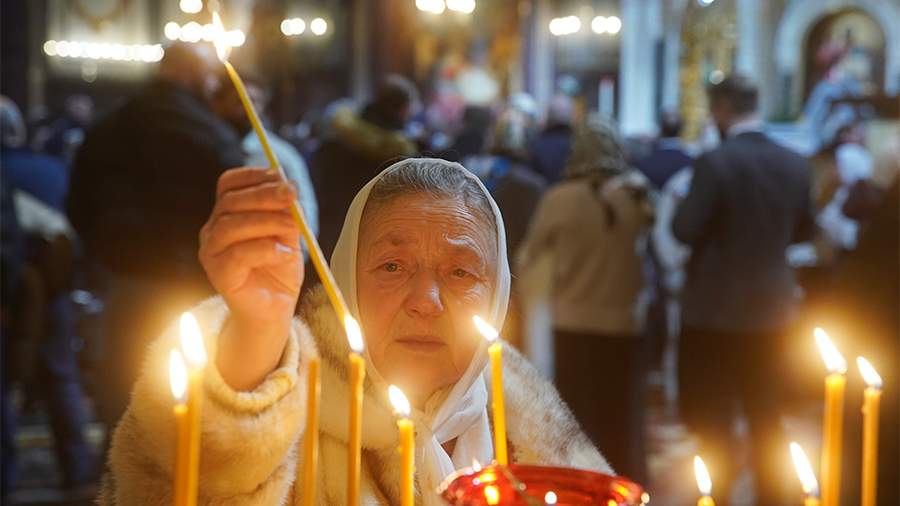November 28 - the beginning of Christmas Lent: meaning, what you can and cannot eat
- Новости
- Local news
- November 28 - the beginning of Christmas Lent: meaning, what you can and cannot eat

At the end of November, Orthodox believers enter the Christmas fast, the last of the multi-day fasts in the church calendar. It lasts 40 days and prepares Christians for one of the most important holidays of the year - Christmas. About what rules should be adhered to during the fast, read in the material "Izvestia".
Christmas fasting in 2024 - when the beginning and the end
The Christmas fast always begins at the same time - November 28. In 2024, this date falls on Thursday. It will last exactly 40 days, until January 6. The next day believers will be able to eat any products.
History of Christmas fasting
The tradition of fasting before Christmas originated in the first centuries of Christianity. The earliest references to this fast date back to the IV-V centuries. At that time, the period of abstinence before the big church celebration was perceived as a sacrifice to God in gratitude for the harvest gathered in summer and fall.
Initially, the length of the Christmas fast did not exceed a week. However, in 1166 at the Council of Constantinople the representatives of the Greek Church decided on a 40-day fast. At the end of the XII century this rule was adopted by the Russian Orthodox Church. It is believed that the tradition was brought to the country by Prince Andrei Bogolyubsky, who was a very pious man and a supporter of "everything Greek".
In Russia, the Christmas fast was called Filippov. The fact is that the feast (the last day before the fast, when it is allowed to eat fleshy food) fell on November 27 - the day of remembrance of the Apostle Philip. In the folk tradition this holiday was celebrated in a big way, having fun and eating enough meat before the long fast.
The essence and meaning of the Christmas fast in 2024
Multi-day fasts precede the most significant church holidays, such as Christmas, Easter, the Assumption of the Virgin Mary, Peter and Paul Day. Their main task is to prepare the believer for the celebration, not only physically, but also spiritually.
The Christmas fast, like any other fast, implies not just the refusal of certain food. As the clergy emphasize, food restrictions are only an auxiliary tool and an element of self-discipline during a period of intense spiritual work. The key components of fasting remain prayer, repentance, getting rid of bad thoughts and bad habits, forgiving offenses and doing good deeds. Without this, abstinence will turn into a mere diet.
What can and cannot be eaten during the Christmas fast in 2024
The Christmas fast is one of the longest of the year, but it can not be called strict. During all 40 days there is a ban on meat, eggs and dairy products. At the same time believers can eat fish and seafood, and on weekends and holidays it is allowed to drink a little wine.
The whole period of fasting can be conditionally divided into three stages. The first one is from November 28 to December 19. According to the church statute, at this time believers can eat fish on Tuesdays, Thursdays, Saturdays and Sundays. On Wednesday and Friday it is necessary to keep dry fasting - to eat only thermally unprocessed products of vegetable origin (bread, nuts, vegetables, fruits, etc.). On Mondays, it is permitted to eat hot food without oil.
From December 20 to January 1, consumption of fish and seafood is allowed only on weekends (Saturday and Sunday). On other days (except for Wednesday and Friday) you can include in the diet hot dishes with vegetable oil.
A few days before Christmas the fast becomes stricter. From January 2 to January 5 on Monday, Wednesday and Friday, according to the statute, it is necessary to observe dry fasting. It is allowed to add oil to food only on weekends, while on Tuesday and Thursday you will have to do without it.
The strictest fast is on Christmas Eve, January 6. On this day you can not take food until the appearance of the first star in the sky.
Nevertheless, as the clergy note, strict observance of all the above rules for laymen is not necessary. Fasting should not become for the believer a period of severe deprivation and even more so a cause of deterioration of health. Therefore, during the fast it is important to take into account the state of one's body and pay attention to changes in one's health.
Some categories of people are allowed not to observe food restrictions during fasting. This applies to those who are ill, undergoing rehabilitation after surgery or a serious illness, engaged in hard physical labor or in conditions in which the choice of food is significantly limited (soldiers, sailors, travelers, etc.). Pregnant and nursing women, small children and the elderly may also eat fasting food during Lent.
At the same time, the spiritual component of fasting (prayer, repentance, renunciation of secular entertainment, intimate life, etc.) must be observed by all.
Earlier "Izvestia" told when in 2025 Orthodox and Catholics will celebrate Easter.
Переведено сервисом «Яндекс Переводчик»


